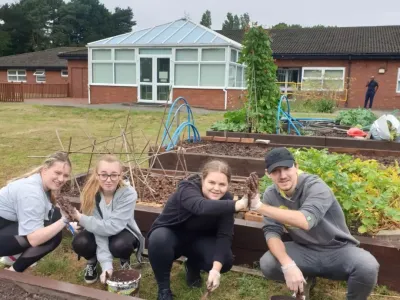
Back To School Mental Health Tips
This is a time of uncertainty. We know school will be different from before, but what will have changed? What will happen if we go into a second lockdown? And what will that mean for exams,university or work? And all of this uncertainty can have an impact on our mental health. So we spoke to the Mental Health Foundation, the UK’s leading mental health charity focused on prevention, and they gave us some tips and advice. Here’s what they had to say...
For many, the return to school or college, and a bit of ‘normality’ will be a welcome change, but there will also be plenty of you who feel worried, overwhelmed and anxious by the idea of going back. This is totally normal, there are lots of reasons you might feel this way but also lots of things you can do to support yourself and those around you.
Young people reported higher levels of loneliness and isolation than any other group as a result of coronavirus and there is a risk that the feelings experienced during lockdown become more long-term. Long-term loneliness for example can cause an increased risk of depression, anxiety and stress. So, while it may be exciting to return to face to face settings, it's important to remember that it's totally normal for those feelings to have persisted. No one knows how long it will take to readjust, so it’s important to adopt positive habits to take care of your mental health, and to reach out and talk to someone you trust when you need to.
Some things you can do to look after your wellbeing during this time are:
Acknowledge what's happened
Whilst dwelling on the coronavirus situation may not be helpful, it's important we acknowledge the scale of what we have all been through over these past few months. It's important to find a balance between respecting the enormity of the situation, the sacrifices that we've been asked to make and the losses we've experienced, without dwelling on the situation.

Find the right news and social media for you
Staying informed and connected is important, but it can also cause us to feel overwhelmed, so find a balance that works for you.

Treat yourself and others with compassion
Remember that everyone's situation is unique, someone may be living with a family member who is shielding, or be a young carer and feel responsibility for their family members’ safety.

For others living with an existing mental health condition, being exposed to new or even familiar environments could set off their difficulties. For example, people with OCD could find it difficult having to go back to school and not being in control of their environment. People with eating disorders could find it difficult returning to face to face settings and not being in control of their eating environment or surrounded by food again when they may have had more control over lockdown. There’s support and resources available for specific mental health problems like anxiety, OCD, eating disorders, and bipolar. There are also helplines and chatrooms like The Sanctuary, Papyrus, CALM and Samaritans.
Set your own boundaries
Everyone will have different levels of what they are comfortable with in terms of social distancing and socialising. Don’t feel pressured into meeting your friends thresholds and don’t put pressure on friends to meet yours.

Get out into nature
Connecting with nature and getting out into green spaces has huge benefits on our mental and physical health. Take a look at Thriving With Nature, a guide we made with WWF to help you get the most out of the green spaces near you. This is also a great way to connect with friends if you are worried about socialising indoors.

Help your teachers to help you
Try to be honest with your teachers about what you’re struggling with and what might help you.

Focus on what you can control
There’s a lot that’s up in the air at the moment. A good way to not get overwhelmed is to acknowledge what you can’t control and try not to worry about it.

How do you feel about going back to school? Do you feel ready or are you a little anxious? What do you think will change - and is that a good thing or a bad thing? Let us know @NCS!




